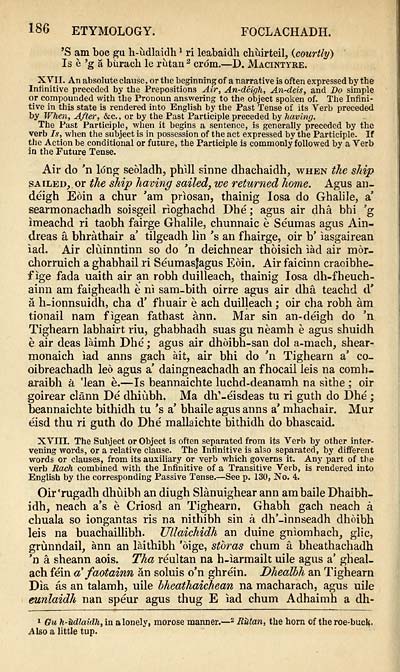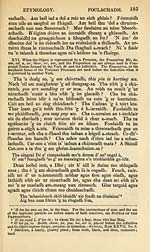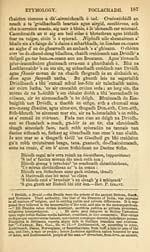Books and other items printed in Gaelic from 1841 to 1870 > Stéidhean a' Ghràmair Ghaëlig
(214) Page 186
Download files
Complete book:
Individual page:
Thumbnail gallery: Grid view | List view

Ì86 ETYMOLOGY.
FOCLACHADH.
'S am boc gu h-ùdlaidh 1 ri leabaidh chùirteil, (courtly)
Is è 'g à bùrach le rùtan 2 crdm. — D. Macintyre.
XVII. An absolute clause, or the beginning of a narrative is often expressed by the
Infìnitive preceded by the Prepositions Air, An-dèigh, An-deis, and Do simple
or compounded with the Pronoun answering to the object spoken of. The Infini-
tive in this state is rendered into English by the Past Tense of its Verb preceded
by When, After, &c, or by the Past Participle preceded by having.
The Past Participle, when it begins a sentence, is generally preceded by the
verb Is, when the subject is in possession of the act expressed by the Participle. If
the Actionbe conditional or future, the Participle is commonly followed by a Verb
in the Future Tense.
Air do 'n ldng seòladh, phìll sinne dhachaidh, when the ship
sAiLED,.or the ship having sailed, we retumed home. Agus an-
dèigh Eòin a chur 'am prìosan, thainig Iosa do Ghalile, a'
searmonachadh soisgeil rìoghachd Dhè; agus air dhà bhi 'g
ìmeachd ri taobh fairge Ghalile, chunnaic è Sèumas agus Ain-
dreas à bhràthair a' tilgeadh lìn 's an fhairge, oir b' ìasgairean
ìad. Air clùinntinn so do 'n deichnear thòisich ìàd air mòr-
chorruich a ghabhail ri Sèumasfagus Eòin. Air faicinn craoibhe-
f ìge fada uaith air an robh duilleach, thainig Iosa dh-fheuch-
ainn am faigheadh è nì sam-bith oirre agus air dhà teachd d'
à h-ionnsuidh, cha d' fhuair è ach duilleach ; oir cha robh àm
tionail nam fìgean fathast ànn. Mar sin an-dèigh do 'n
Tighearn labhairt riu, ghabhadh suas gu nèamh è agus shuidh
è air deas làimh Dhè ; agus air dhòibh-san dol a-mach, shear-
monaich ìad anns gach àit, air bhi do 'n Tighearn a' co-
oibreachadh leò agus a' daingneachadh an f hocaii leis na comh-
araibh à 'lean è. — Is beannaichte luchd-deanamh na sìthe ; oir
goirear clànn Dè dhiùbh. Ma dh'-èisdeas tu ri guth do Dhè ;
beannaichte bithidh tu 's a' bhaile agus anns a' mhachair. Mur
èisd thu ri guth do Dhè mallaichte bithidh do bhascaid.
XVIII. The Subject or Object is often separated from its Verb by other inter-
vening words, or a relative clause. The Infmitive is also separated, by different
words or clauses, from its auxiliary or verb which governs it. Any part of the
verb Rach combined with the Infinitive of a Transitive Verb, is rendered into
English by the corresponding Passive Tense.— -See p. 130, No. 4.
Oir'rugadh dhùibh an diugh Slànuighear ann ambaile Dhaibh-
idh, neach a's è Criosd an Tighearn. Ghabh gach neach à
chuala so iongantas ris na nithibh sin à dh'-ìnnseadh dhòibh
leis na buachaillibh. Ullaichidh an duine gnìomhach, glic,
grùnndail, ànn an làithibh 'òige, stbras chum à bheathachadh
'n à sheann aois. Tha rèultan na h-ìarmailt uile agus a' gheal-
ach fèin a faotainn àn soluis o'n ghrèin. Dhealbh an Tighearn
Dìa às an talamh, uile bheathaichean na macharach, agus uile
eunlaidh nan spèur agus thug E ìad chum Adhaimh a dh-
1 Gu h-Mlaidh, in alonely, morose raanner.— 2 RUtan, the horn of the roe-buck.
Also a little tup.
FOCLACHADH.
'S am boc gu h-ùdlaidh 1 ri leabaidh chùirteil, (courtly)
Is è 'g à bùrach le rùtan 2 crdm. — D. Macintyre.
XVII. An absolute clause, or the beginning of a narrative is often expressed by the
Infìnitive preceded by the Prepositions Air, An-dèigh, An-deis, and Do simple
or compounded with the Pronoun answering to the object spoken of. The Infini-
tive in this state is rendered into English by the Past Tense of its Verb preceded
by When, After, &c, or by the Past Participle preceded by having.
The Past Participle, when it begins a sentence, is generally preceded by the
verb Is, when the subject is in possession of the act expressed by the Participle. If
the Actionbe conditional or future, the Participle is commonly followed by a Verb
in the Future Tense.
Air do 'n ldng seòladh, phìll sinne dhachaidh, when the ship
sAiLED,.or the ship having sailed, we retumed home. Agus an-
dèigh Eòin a chur 'am prìosan, thainig Iosa do Ghalile, a'
searmonachadh soisgeil rìoghachd Dhè; agus air dhà bhi 'g
ìmeachd ri taobh fairge Ghalile, chunnaic è Sèumas agus Ain-
dreas à bhràthair a' tilgeadh lìn 's an fhairge, oir b' ìasgairean
ìad. Air clùinntinn so do 'n deichnear thòisich ìàd air mòr-
chorruich a ghabhail ri Sèumasfagus Eòin. Air faicinn craoibhe-
f ìge fada uaith air an robh duilleach, thainig Iosa dh-fheuch-
ainn am faigheadh è nì sam-bith oirre agus air dhà teachd d'
à h-ionnsuidh, cha d' fhuair è ach duilleach ; oir cha robh àm
tionail nam fìgean fathast ànn. Mar sin an-dèigh do 'n
Tighearn labhairt riu, ghabhadh suas gu nèamh è agus shuidh
è air deas làimh Dhè ; agus air dhòibh-san dol a-mach, shear-
monaich ìad anns gach àit, air bhi do 'n Tighearn a' co-
oibreachadh leò agus a' daingneachadh an f hocaii leis na comh-
araibh à 'lean è. — Is beannaichte luchd-deanamh na sìthe ; oir
goirear clànn Dè dhiùbh. Ma dh'-èisdeas tu ri guth do Dhè ;
beannaichte bithidh tu 's a' bhaile agus anns a' mhachair. Mur
èisd thu ri guth do Dhè mallaichte bithidh do bhascaid.
XVIII. The Subject or Object is often separated from its Verb by other inter-
vening words, or a relative clause. The Infmitive is also separated, by different
words or clauses, from its auxiliary or verb which governs it. Any part of the
verb Rach combined with the Infinitive of a Transitive Verb, is rendered into
English by the corresponding Passive Tense.— -See p. 130, No. 4.
Oir'rugadh dhùibh an diugh Slànuighear ann ambaile Dhaibh-
idh, neach a's è Criosd an Tighearn. Ghabh gach neach à
chuala so iongantas ris na nithibh sin à dh'-ìnnseadh dhòibh
leis na buachaillibh. Ullaichidh an duine gnìomhach, glic,
grùnndail, ànn an làithibh 'òige, stbras chum à bheathachadh
'n à sheann aois. Tha rèultan na h-ìarmailt uile agus a' gheal-
ach fèin a faotainn àn soluis o'n ghrèin. Dhealbh an Tighearn
Dìa às an talamh, uile bheathaichean na macharach, agus uile
eunlaidh nan spèur agus thug E ìad chum Adhaimh a dh-
1 Gu h-Mlaidh, in alonely, morose raanner.— 2 RUtan, the horn of the roe-buck.
Also a little tup.
Set display mode to:
![]() Universal Viewer |
Universal Viewer | ![]() Mirador |
Large image | Transcription
Mirador |
Large image | Transcription
Images and transcriptions on this page, including medium image downloads, may be used under the Creative Commons Attribution 4.0 International Licence unless otherwise stated. ![]()
| Rare items in Gaelic > Books and other items printed in Gaelic from 1841 to 1870 > Stéidhean a' Ghràmair Ghaëlig > (214) Page 186 |
|---|
| Permanent URL | https://digital.nls.uk/101714167 |
|---|
| Description | Out-of-copyright books printed in Gaelic between 1631 and 1900. Also some pamphlets and chapbooks. Includes poetry and songs, religious books such as catechisms and hymns, and different editions of the Bible and the Psalms. Also includes the second book ever published in Gaelic in 1631. |
|---|

